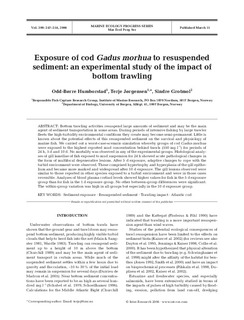Exposure of cod Gadus morhua to resuspended sediment: an experimental study of the impact of bottom trawling
Journal article, Peer reviewed
Permanent lenke
http://hdl.handle.net/11250/108731Utgivelsesdato
2006-03-15Metadata
Vis full innførselSamlinger
- Articles [3001]
Originalversjon
http://dx.doi.org/10.3354/309247Sammendrag
Bottom trawling activities resuspend large amounts of sediment and may be the main agent of sediment transportation in some areas. During periods of intensive fishing by large trawler fleets the high-turbidity environmental conditions they create may become semi-permanent. Little is known about the potential effects of this resuspended sediment on the survival and physiology of marine fish. We carried out a worst-case-scenario simulation whereby groups of cod Gadus morhua were exposed to the highest reported mud concentration behind trawls (550 mg l–1) for periods of 24 h, 5 d and 10 d. No mortality was observed in any of the experimental groups. Histological analyses of gill lamellae of fish exposed to mud suspension for 24 h showed acute pathological changes in the form of multifocal degenerative lesions. After 5 d exposure, adaptive changes to cope with the turbid environment were observed. These comprised hypertrophy and hyperplasia of the gill epithelium and became more marked and widespread after 10 d exposure. The gill lesions observed were similar to those reported in other species exposed to a turbid environment and were in those cases reversible. Analyses of blood plasma cortisol levels showed higher values for fish in the 5 d exposure group than for fish in the 1 d exposure group. No other between-group differences were significant. The within-group variation was high in all groups but especially in the 10 d exposure group.
